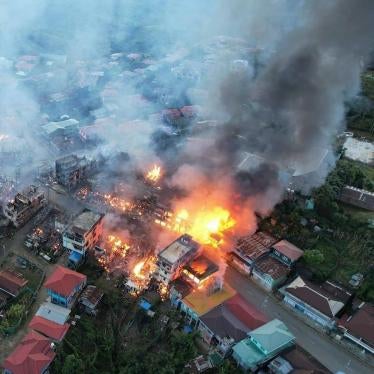(New York) – Payments by energy and extractive companies to entities under the control of the Myanmar military are providing key funds to sustain the junta and pose serious legal, financial, and reputational risks to investors in those companies.
In October, Human Rights Watch wrote to several dozen investment firms that own shares in companies that operate in joint partnership with entities under the control of the junta installed by Myanmar’s military, which seized control in a February coup, engaged in a brutal crackdown against protestors, and is implicated in multiple crimes against humanity, killings, torture, and war crimes. Joint projects involving natural gas generate over a billion dollars in foreign revenue for the junta annually, transmitted in US dollars to the junta’s bank accounts in foreign countries.
“Investors need to act now to help block massive payments currently flowing to a brutal military junta,” said John Sifton, Asia advocacy director at Human Rights Watch. “The junta is highly dependent on foreign US dollar income from mining and natural gas, and targeted new measures to block it may be the only real way to achieve changes in their behavior.”
Under existing contracts with government entities, energy companies have limited options for halting payments that go to the junta, but they would need to comply with sanctions or other financial regulatory actions blocking those payments if imposed by the US, EU, and other key governments, Human Rights Watch said.
Human Rights Watch wrote to investment firms with major investments in at least one of the following companies: Total Energies, Chevron, PTT or its subsidiary PTTEP, and POSCO, which together are responsible for the bulk of Myanmar’s natural gas production and revenues.
Blackrock, State Street, and Vanguard own substantial stakes in all four companies, giving them especially potent leverage with company leadership. Human Rights Watch also wrote to JP Morgan Chase, Bank of New York Mellon, Fisher Asset Management, and Dimensional Fund Advisors, as well as to several other funds of varying sizes with significant shares in Total Energies. Human Rights Watch has previously corresponded with Total Energies and PTT about their Myanmar operations.
The letters to firms and investors detail how companies providing revenue to the junta are facing serious legal, financial, and reputational risks and are unable to fulfill their human rights responsibilities in Myanmar under the UN Guiding Principles on Business and Human Rights.
Investment firms also have human rights responsibilities and could themselves face financial and reputational risks as shareholders in companies generating billions of dollars for the junta.
Human Rights Watch received no reply from Blackrock, Vanguard, or other US-based investors. State Street, which holds substantial blocks of shares in Total Energies, Chevron, and PTT and smaller stakes in POSCO, responded in an email on October 22 saying that the letter had been “passed on to our Asset Stewardship team who develop and implement our engagement strategies with portfolio companies in order that they can consider how this issue might be built into future engagements.”
To address possible unintended negative consequences, the letters outline methods for blocking payments without disrupting natural gas production itself.
Investors should move swiftly to raise concerns with companies, Human Rights Watch said.
“Investment firms should be using their leverage as major shareholders to convince companies to support sanctions by the US, EU, and other concerned governments, freezing payments into the junta’s offshore accounts,” said Sifton. “Failing to act perpetuates harm to the people of Myanmar and only exposes companies to further risk.”









